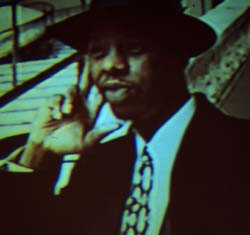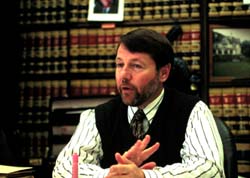One person who probably understands the harsh reality of prison more than most is Clayton Collins, who founded the Underground Railroad in the spring of 1996. Collins was sentenced by Goodman to four years in federal prison for bank robbery in the late '80's. After serving three years of his sentence, Collins worked his way into a job with the city of Oakland Parks and Recreation department and eventually started the Railroad using much of his own experience as a guide for the program.
Upon their release from custody, participants in the Underground Railroad meet with Collins, job developers and counselors and create a plan for the future which either includes going back to school or finding full-time work. Once participants have a job or are in school, they report back to the staff on a weekly basis.
During this transition from a life of crime, participants are required to meet with Collins once a week for what he terms, "attitude adjustment." These educational and counseling sessions take the form of a dialectic which draws on themes of economic, political and social empowerment.
In an hour-long discussions, Collins tries to convince young men that if they work hard, abide the law and use the system to their advantage, they can attain whatever they want.
Collins used his own transition from crime to mainstream society to construct the framework of the program, in which basic survival and social skills are emphasized. According to Collins these include getting participants to understand: health, the pitfalls of crime, rudimentary economics, participation in a democracy and the importance of education.
"Health is a thing most of these guys don't understand. "When I was 18 and got kidnapped by rival drug dealers and they were talking about where they were going to dump my body, I realized it wasn't very good for my health," said Collins. "I tell them, 'when you're in the game (selling drugs), you're going to get shot and beat and when you get hit in the head with a baseball bat, you're going to bleed and get a concussion.'"
In a recent session, Collins challenged a group of eight men recently released from the courts to prove why society should care whether they survive. When no one spoke up immediately, Collins gave them a lesson in exercising their freedom of speech.
"They say that he who has no voice loses everything," said Collins. "You know why you can't get nothing? Because you don't speak up; you sit there and don't say nothin', and you suffer passively. But when you're sittin' in that jailhouse, your talking big shit with all your partners."
Playing the role of an interrogator, Collins asked the members of the group to describe one thing they needed to fulfill their dream. A young man answered, "respect." Collins said, "how do you get respect?" The answer was, "money." Collins asked, "how could you get money?" "I'm a barber," was the answer. Collins retorted, "do you have a barber shop?" "No." "Do you have any credit?" "No." "You need a building, right?" No answer. "What do you have to get what you need?" "Nothin'."
Collins later explained that there was a service through the Oakland Office of Economic Development which helps inner-city entrepreneurs to get loans and formulate business plans and that he would show the young man where it was.
According to Collins and Goodman, a major reason Collins can communicate effectively with recently released felons is that he understands the causes and effects of getting involved in crime. "Clayton has credibility. He's been to prison. He has a unique ability to get into these little gangsters faces and yell and scream and lecture to convince them that they may end up dead," said Goodman.
As a result of his past, Collins has respect and knowledge that few in the probation office can match. "These kids can shine-on even a sophisticated probation officer because they [probation officers] want these guys to have the warm fuzzies. It's tougher for them to shine on Clayton because he knows people on the street. He walks a fine line between gangsters and the court," said Goodman.
Collins also knows what its like trying to re-enter society as a convicted felon. "No one ever asks the convict what the effects are on him. People treat you different when you apply for a job and have to tell them you are on probation. It gets discouraging, then a friend gives them a gun and some coke and their back on the streets."
Collins and Goodman acknowledge that while Collins' approach is effective, it is unconventional to put a convict in charge of a sentencing program. And they have encountered their share of critics as a result. "Normal folks down at Park and Rec. have said that they don't like Clayton's language, but you can't say 'pretty please' and 'may I' to a gangster... Yeah, I've taken some heat for supporting Clayton," said Goodman.
"Some people want to wage a war on crime and to them that means getting the street-level dealer, so they don't necessarily want a program like this to succeed," said Collins.
Housed Oakland's Parks and Recreation Office, the program is part of the city's Crime Prevention and Intervention Unit which also engages in community outreach efforts and has a budget of about $200,000 a year, including staff salaries.
"I've been here for 14 years and I've never seen a program like this. This is not midnight basketball, which was a total failure, or some touchy-feely thing. I've seen a response that we have not seen from any other program." said Goodman, the judge who sentences all convicted felons for the Alameda County Superior Court.
According to Goodman, there are hundreds of alternative sentencing programs, but the majority of them are focused on drug rehabilitation, and not suitable for people without an addiction. Drug dealers who are often not drug addicts, are frequently placed into these programs and do not receive the training or education they need to get off the street.
The Underground Railroad's relative success is explained by a variety of factors. It provides tangible options for people, such as job referrals and support in attaining education; whereas the County's overwhelmed probation department, which employs 220 probation Officers to counsel approximately 13,000, has little means or time to do so.
Currently, many first-time, non-violent felon's probation cases are "banked." This means the felons are sent a notification saying they are on probation, but the system is too busy to see them. Abril Alcatentii, who like Henderson, is now participating in the Underground Railroad program after having his probation revoked for a second drug offense, believes banking probation cases perpetuates a criminal cycle for many.

Clayton Collins
"When I was 18 and
got kidnapped by rival drug dealers and they were talking
about where they were going to dump my body, I realized
it wasn't very good for my health"

Judge Goodman

Abril Alcatentii